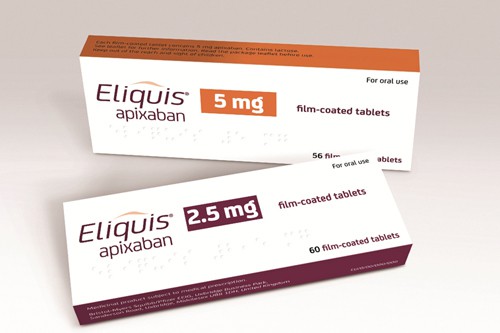
The National Institute for Health and Clinical Excellence (NICE) has recommended Pfizer and Bristol-Myers Squibb’s anticoagulant Eliquis as a treatment for atrial fibrillation.
NICE’s final draft guidance backs the use of Eliquis (apixaban) in line with its licensed indications for the prevention of stroke and systemic embolism in people with non-valvular atrial fibrillation and one or more risk factors.
The guidance, which is expected to be finalised next month, puts Eliquis on course to compete with Boehringer Ingelheim’s Pradaxa (dabigatran) and Bayer’s Xarelto (rivaroxaban), both of which gained an atrial fibrillation recommendation from NICE last year.
NICE’s new Eliquis guidance also recommends that doctors have an informed discussion with their patients about the risks and benefits of the BMS-Pfizer drug, compared to Pradaxa, Xarelto and warfarin.
If they are already taking warfarin then such a discussion should also take into account the patient’s current level of international normalised ratio (INR) control, a measure of how long it takes the blood to clot, NICE said.
Professor Carole Longson, NICE Health Technology Evaluation Centre director, said: “From the evidence submitted, the Committee concluded that apixaban was more clinically effective than warfarin for the primary efficacy outcome of reducing stroke and systemic embolism.
“The Committee also noted that treatment with apixaban resulted in fewer bleeding events than warfarin, including a reduced rate of intracranial bleeding.
“The Committee recognised that intracranial bleeding has a high mortality rate and a large impact on a person’s quality of life, and is the most feared bleeding outcome for people taking any type of anticoagulant.”
Although warfarin has ruled the anticoagulant market for nearly sixty years, its use suffers from patient compliance issues and multiple interactions with food, alcohol and drugs.
Moreover, newer drugs like Eliquis, Pradaxa and Xarelto have potential benefits when it comes to monitoring and does adjustment requirements.
NICE’s Appraisal Committee concluded Eliquis was cost-effective compared with warfarin, and that its most plausible ICER was less than £20,000 per QALY gained. This was based on a cost per day for both the 2.5mg and 5mg doses of £2.20 (excluding VAT), close in price to Xarelto and equal to Pradaxa.




